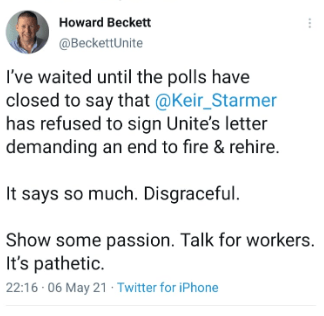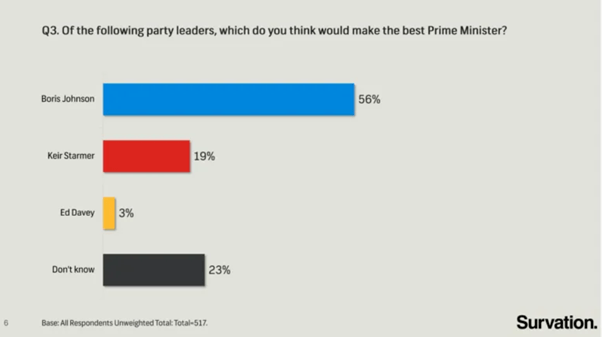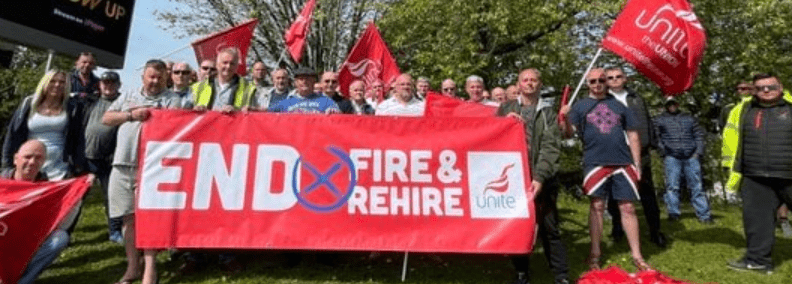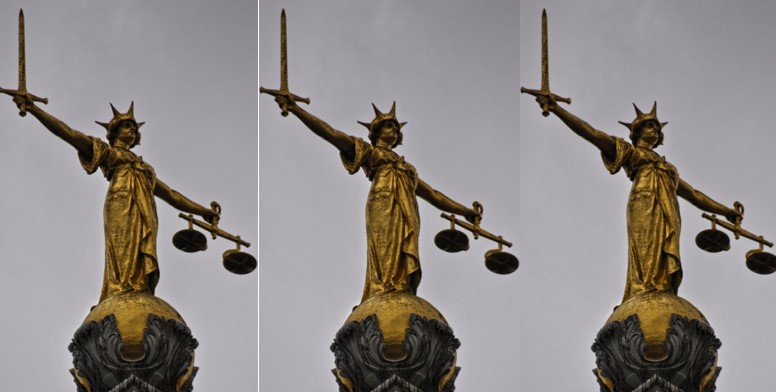As all the opinion polls had predicted over the past few weeks, the elections on Thursday have produced a disaster for the Labour Party. To be more precise, the results are a crushing rejection of the Tory-lite policy and approach of Labour leader, Keir Starmer.
With only a few bright spots here and there, the local government and mayoral elections have seen Labour pushed to a level of support far below that inherited by Starmer. As we write, there are many results and the counts for the Welsh Assembly and Scottish Government elections that are still to come in, but a pattern has been set.
Nothing sums up the dismal performance of Labour’s right-wing better than its loss – which we anticipated – in the parliamentary by-election in Hartlepool, after having been a Labour seat for the best part of sixty years. Even compared to 2019, when the Labour vote was low, and the Party was competing against both Tories and the Brexit Party, Labour attracted nearly twice as many votes as it did on Thursday. The question that must be asked is why did half of Labour’s 2019 voters stay away? There is a two-word answer to that question…Keir Starmer.
Labour should have been 20 points ahead
Faced with the most rotten and corrupt government in living memory, the worst Covid death rate in Europe, a greater economic collapse compared to any other major G-7 economy, Labour ought to have been twenty points ahead in these elections. Labour should have been cruising to victory in one local council after another and ought to have won Hartlepool at a canter. Instead, the leadership of the Party are desperately casting around for excuses, scape-goats and alibis.
Astonishingly, there are even right-wing Labour MPs who are still trying to blame Jeremy Corbyn for the disaster of May 6, even though it is fourteen months since he left office. Lord Mandelson and others are tying to blame the two ‘Cs’ – Covid and Corbyn – and there is no doubt that the anti-Labour media and the BBC will give them as much airtime and publicity as they want. But the reality is that Labour’s right wing, and especially the likes of Mandelson, have nothing to offer working class people.
Just in the last week, while Jeremy Corbyn was seen on picket lines supporting workers who are disgracefully threatened with having their living standards slashed through ‘fire and re-hire’, his successor, Keir Starmer, has refused to support a pledge against that practice.

Criminal cronyism and corruption
Neither are these results due to Covid. If Johnson and the Tories now appear to be reaping some political ‘bounce’ for the vaccination programme and the much-heralded end of lockdown, that is only because the Labour leadership have let them off the hook for a year. Instead of highlighting the criminal cronyism and corruption of the Tories, instead of demanding resources for NHS staff and facilities, at every turn the Labour leadership has effectively given qualified support to the entire Tory strategy on the pandemic.
They ought to have demanded the integration of private hospitals and health care into the fight against Covid. They ought to back the demands of the NHS trade unions for a decent pay rise. They ought to have backed the schoolteachers when they insisted that schools were not safe. Instead, the Starmer team has utterly failed to show any major distinguishing feature between themselves and the Tories.
For the supporters of Keir Starmer inside the Labour Party, there is no longer anywhere to hide. It is no use suggesting that Starmer’s leadership is still a ‘work in progress’. Starmer fought for the leadership fourteen months ago with a series of ten pledges, and it is not the fault of the Labour Party membership or the electorate that he has ditched those pledges since he took office.
Corbyn’s leadership victory had an immediate and massive impact
When Jeremy Corbyn was elected leader – in fact before he was declared leader – there was a wave of enthusiasm among Labour members and supporters. There was an immediate dividend, in terms of increased membership of the party, making Labour the biggest political party in western Europe, and solving overnight all its financial worries. Labour had an exciting vibrancy to it. There was – at last, party members thought – a clear distinction between the policies of Labour and the Tories; there was clear blue water between the two.

Now, under Starmer, there has been a haemorrhage of members – well over ten per cent have left – and a catastrophic drop in morale. The Party is once again in financial difficulties. In comparison to 2015-17, Labour today is becoming a wasteland, where members are forbidden the right to discuss some issues, are suspended for disobeying the ‘centre’ and are excluded from participation in the selection of local candidates. It is not just the members who complain, it is the voters, who can no longer see what Labour stands for.
A week before these elections, at the first post-Covid ‘rave’ on Merseyside, five thousand young people chanted ‘Oh Jeremy Corbyn’, as they might have done five years ago. Meanwhile, on the same day in Hartlepool, Labour MPs were struggle on the doorstep to make any headway at all. Labour relied in that campaign not on waves of enthusiastic members, but on about 90 full-time paid workers, most on short-term contracts and who will now lose their jobs. According to the Guardian (May 5) “about half the Hartlepool ground team was due to leave following tomorrow’s vote as a cost-saving measure.”
Johnson personally more favoured than Starmer
According to a poll by Survation, only 31% of Hartlepool people felt favourably toward Labour, but that abysmal figure was even worse, at 22%, for Starmer personally. When questioned about who would make the best Prime Minister, support for Boris Johnson – and remember, this is a man who has at best a passing acquaintance with the truth – was nearly three times higher than Starmer got. Johnson might be a corrupt, bombastic and thoroughly unpleasant person, but at least voters know what he is! The fact is that no-one knows for sure what Starmer stands for.
Voters are being offered a leader and a Shadow Cabinet whose main concern is to distinguish themselves from Jeremy Corbyn. Starmer has been so desperate to appear to be ‘not Corbyn’ that he has ‘moderated’ everything he says and does. Above all, he has moderated his opposition to Johnson, often abstaining in parliament on key issues, rather than opposing the Tories. The only aspect of his leadership which he has not ‘moderated’ has been his relentless hounding of the left of his own party.
Many Labour Party members will be disheartened by these election results, and that is entirely understandable. But Left Horizons believes that we cannot walk away from the fight. On the contrary, we must come out fighting, harder than ever. The right-wing of the Labour Party have nothing to offer, but socialist ideas are relevant, and they are needed to address the day-to-day needs of working-class people. We have to fight harder than ever for the traditional socialist aims of labour movement.
Conservative infiltrators in the Labour Party
We have to call things by their proper names. The extreme right of the Labour Party, like Mandelson, are Conservatives in all but name; they are infiltrators. They are friends of business and the super-rich, wealthy lobbyists in their own right, and they have a political outlook a million miles removed from the lives of ordinary workers. It will seem utter madness to most Labour members, but the right-wing argument – that Labour needs to move further right – is perfectly logical from the point of view of these swivel-eyed ideologues on the right of the party.
As their sabotage of the 2017 election shows, they would prefer to see the Tories in power than have a radical Labour Party in office. Mandelson and his ilk would have opposed the establishment of the NHS in 1948 and all the reforms of that 1945 Labour government. Indeed, for them, the last year has been a ‘success’, in that their fundamental and over-arching aim is not Labour’s electoral success, but the rooting out of all radicalism from the Party.

According to a BBC report, one of Starmers’ supporters has said that the task now is “to incinerate the politics of the far left“. There is only answer to that and only one justification for staying in the Party now, and that is to organise and fight these saboteurs.
It is time for change inside the Labour Party. It is time to demand that CLPs move votes of no-confidence in Keir Starmer as some have already done. Despite an overwhelming mandate from the membership, the parliamentary right-wing initiated votes and letters of no-confidence in Jeremy Corbyn in 2016 – precipitating a new leadership election that he won with a bigger majority.
Now the boot is on the other foot. Affiliated unions and CLPs should demand that Starmer should stand down now and that there is a thorough-going debate in the Party about where it is going, what its policies must be, and how it can win back power.
We will comment in later articles and editorials on other results to be announced later, such as those in Liverpool and in the Scottish and Welsh Assembly votes



